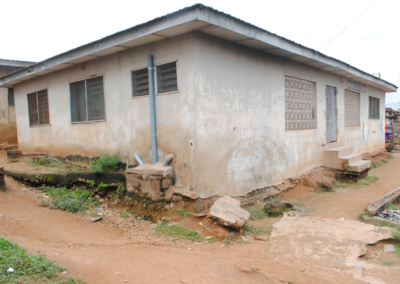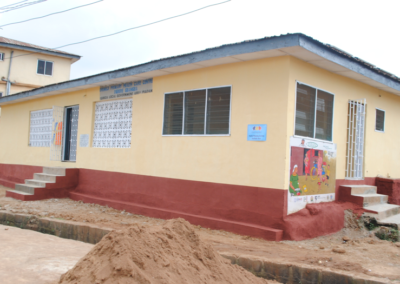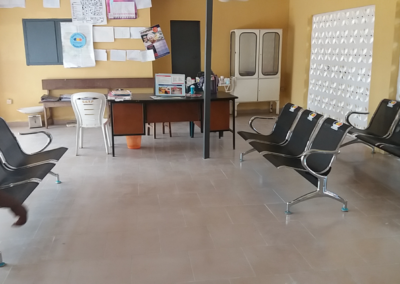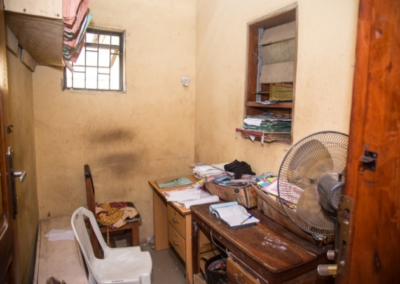Adapted from a story written by the Measurement, Learning & Evaluation Project for the Urban Reproductive Health Initiative. Nigeria’s 72-hour makeover is a best practice intervention that the Challenge Initiative is working to adapt, apply, scale up and sustain in its efforts to rapidly expand access to family planning services.
Mrs. Maruna Diko is the family planning provider at Bwari General Hospital in Abuja Federal Capital Territory (FCT). Before benefitting from a Nigerian Urban Reproductive Health Initiative (NURHI) 72-Hour Makeover, there was no sitting area in her section of the hospital, and many rooms had leaky roofs. She had to ask women to be patient and wait outside for their turn.
“The Makeover is a dream come true. Where I was before, that place was a cave. I didn’t have an ideal family planning section… But now, everything that an ideal family planning room is supposed to have, I have.” – Mrs. Maruna Diko, FP Provider, Bwari General Hospital
According to a baseline survey conducted between 2010 and 2011 by NURHI and the Measurement, Learning & Evaluation (MLE) Project, at least three-quarters of health facilities offered some form of family planning service. The majority of facilities in the project cities of Abuja FCT, Benin, Ibadan, Ilorin, Kaduna and Zaria provided four or more family planning methods.
Even though most facilities offer several family planning methods, few facilities have all the equipment and supplies needed to provide certain methods. For example, at baseline in Ibadan, only 23 percent of the 59 facilities surveyed had all of the supplies necessary to provide IUDs, and 18 percent of facilities had all the items needed to provide implants.
The 72-Hour Makeover
At 3:30 pm on a Friday afternoon, a health clinic closes for the weekend; by the time doors open at 8:00 am on Monday morning, the clinic opens with a facelift and conforms to the performance standards for family planning in Nigeria. The goal of a 72-Hour Makeover is to provide rapid improvement to infrastructure and equipment in family planning clinics. The effort, conducted over a single weekend, transforms clinics from a dilapidated state to a fresh, modern environment without disrupting services.
Facilities are chosen based on their performance on NURHI’s Performance Improvement Plan and on the number of female patients served. High-volume facilities are also prioritized. Once a set of facilities are selected for makeover, NURHI receives clearance from the Ministry of Health and conducts informational meetings and assessments at each clinic or hospital to determine necessary improvements.
Then a team of volunteers from the community, including Ministry of Health officials, social mobilizers, facility service providers, community artisans and NURHI staff work together over the weekend to revitalize the facility. The Makeovers typically include painting walls; cleaning and servicing equipment; and displaying health informational posters, flip charts and message boards with information on family planning. Additionally, NURHI helps ensure that the clinics that receive Makeovers have a national family planning register to track client visits. Each facility is also presented with a plaque, which is proudly placed at the entrance.
 Between 2011 and 2012, 35 clinics and facilities in Abuja FCT, Ibadan, Ilorin and Kaduna received Makeovers. The nature of the Makeovers has shifted over time. At first, they began with a large financial investment on NURHI’s part to assess the condition of the facilities and partner with providers, local leaders and other community members to do a complete renovation of the clinics. In an effort to increase program sustainability, NURHI’s role in the Makeover process has transitioned to that of a consultant; NURHI helps facilities figure out how to work well within their current infrastructure, refurbish existing equipment rather than replace it and maintain a focus on quality service provision. All parties involved have acknowledged that it does not need to cost very much to refurbish a facility but that facility staff must be receptive to participating in the repair of their facility as well as maintaining the facility and equipment.
Between 2011 and 2012, 35 clinics and facilities in Abuja FCT, Ibadan, Ilorin and Kaduna received Makeovers. The nature of the Makeovers has shifted over time. At first, they began with a large financial investment on NURHI’s part to assess the condition of the facilities and partner with providers, local leaders and other community members to do a complete renovation of the clinics. In an effort to increase program sustainability, NURHI’s role in the Makeover process has transitioned to that of a consultant; NURHI helps facilities figure out how to work well within their current infrastructure, refurbish existing equipment rather than replace it and maintain a focus on quality service provision. All parties involved have acknowledged that it does not need to cost very much to refurbish a facility but that facility staff must be receptive to participating in the repair of their facility as well as maintaining the facility and equipment.
Key Benefits of the 72-Hour Makeover
The benefits of the NURHI 72-Hour Makeover process are abundant. The Makeover fosters an enabling environment for quality family planning services by creating a more inviting waiting area, assuring needed privacy for counseling and facilitating better infection prevention. The 72-Hour Makeover has also helped build the confidence and morale of the family planning providers by ensuring they have the tools they need to provide a full range of quality services. The 72-Hour Makeover has facilitated an uptake in family planning clientele as in the case of Kujama primary health care center in Kaduna where monthly clients increased after the Makeover.










